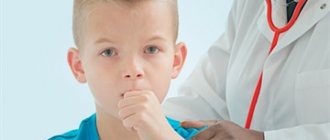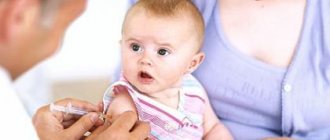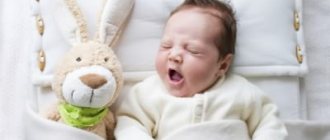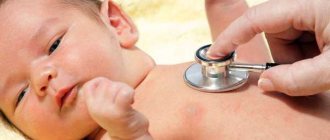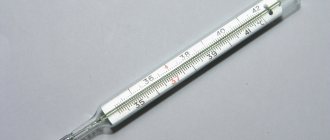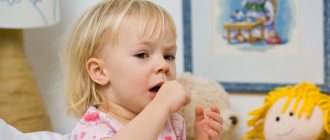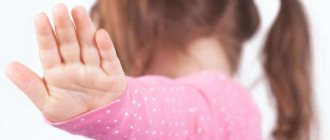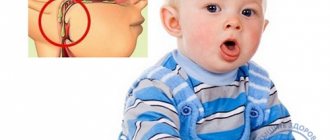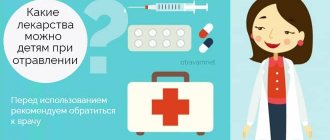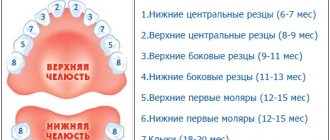Tweet
If a child develops a cough that prevents him from breathing normally day and night, parents try to get rid of it as quickly as possible. And the most commonly used cough medications are syrups. But for the syrup to give its results, it must be selected correctly, depending on the age of the child and the type of cough.
Today we will talk about the best children's syrups for dry and wet coughs.
Why syrups?
Advantages of syrups compared to other medicines:
1. Convenience of dosing . The packaging of the drug contains a special measuring spoon, syringe or measuring cup, which allows you to quickly determine the desired dose.
2. Consistency . Syrups have a viscous, soft consistency, which makes it possible to quickly improve the patient’s condition by gently coating the throat, softening tissue irritation, soothing and softening damaged mucous membranes.
3. Pleasant taste . Berry or fruit flavors overcome the bitterness, and children of any age can drink syrups with pleasure.
4. Good absorption . Syrups are normally accepted by the gastrointestinal tract, rarely cause digestive upset, are quickly absorbed into the systemic circulation and have the necessary therapeutic effect.
5. Ready-made mixtures . Syrups are ready-made mixtures that do not need to be prepared before use, but can be given to the child immediately.
6. Wide range, different price categories . Today there are many varieties of syrups on sale, to suit every budget.
Purpose of syrups
Cough syrups for children are intended for easy swallowing of medicine for inflammatory diseases of the nasopharynx, throat and mucous membranes of the oral cavity. During illness, the baby's mucous membranes are irritated, so any attempts to drink a tablet, even previously crushed into powder, can lead to vomiting.
All children's cough syrups can be divided into 4 groups:
1. Antitussives - inhibit the cough reflex by affecting the brain.
2. Expectorants - stimulate the production of mucus in the respiratory tract and improve its coughing.
3. Mucolytic - reduce the viscosity of sputum.
4. Antihistamines - reduce the manifestations of allergies, therefore they are prescribed for allergic forms of cough.
Let's take a closer look at children's syrups for dry and wet coughs.
Why is it important to know the types of coughs in children?
There are quite a lot of types of cough in children under 1 year of age, and other age groups. The most important task of parents is to correctly determine the type of cough in order to choose the most effective remedy to get rid of it.
According to the degree of sputum discharge, they are distinguished
- Dry. The second name is non-productive cough . It is characterized by harshness of breathing, the presence of inflammatory processes in the respiratory tract, and their swelling. The mucus does not clear on its own, causing prolonged bouts of coughing.
- Wet. The second name is productive cough . In this case, sputum is either completely absent or present in small quantities. The cough becomes wet after a non-productive one, when treatment has already been used to expel sputum.
By duration of treatment
- A sudden cough most often occurs when a foreign body enters the body.
- A cough that lasts two months is called a persistent cough..
- Chronic cough occurs during exacerbation of a chronic disease and lasts more than two months.
- A recurrent cough occurs periodically and indicates the occurrence of an inflammatory process in the respiratory system of the body.
According to the presence of inflammation
- Barking . Indicates the presence of inflammation in the glottis. If measures to localize it are not taken in time, the child may experience suffocation or swelling of the larynx.
- Paroxysmal . This cough indicates that the child has whooping cough. This type of cough also occurs due to allergic reactions.
- A wheezing cough is a sign of asthma or chronic obstructive pulmonary disease, in other words, acute bronchitis.
Types of acceptable drugs
A baby under the age of one year cannot be given solid dosage forms, so drugs for such children are available in the form of syrups or drops. In addition to oral medications, inhalations through a nebulizer, as well as compresses and rubbing are done.
Medicines vary in their effects. Antitussive drugs affect the central nervous system, suppressing the activity of certain brain centers that control the cough reflex. Such drugs are rarely prescribed to children under 12 months of age, since many of them depress respiratory function. Most often, to facilitate the removal of sputum, children are recommended to be given expectorants or mucolytics. These drugs are intended to liquefy viscous bronchial secretions and remove them.
Anti-cough drugs are also classified according to their composition. On this basis, funds are divided into:
- herbal preparations;
- medications that contain artificially synthesized components;
- combination drugs.
Why is syrup more effective?
Why doctors are inclined to use syrups in the treatment of cough, especially in children. It's simple. Cough syrup for children over one year of age is the most effective expectorant today.
The effect comes much faster than when taking pills.
To do this, you can conduct a simple visual experiment. Take a sponge or washcloth and moisten it with water. Next, put the tablet on it and pour a little syrup. The time taken to dissolve the tablet will reach 30 minutes.
At the same time, the syrup will be absorbed in just a few seconds. It's the same with our lungs. The liquid is absorbed by the body faster than the solid substance, so the treatment effect occurs 5 times faster.
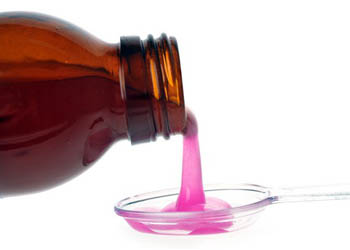
Treatment with syrup is much easier than giving pills to a small child
Another compelling argument in favor of cough syrup for children under one year of age. It is much more convenient to give to a child than other dosage forms. Not every baby will be able to swallow a pill.
Almost all syrups have a sweet taste that children like.
Each package contains a measuring spoon or syringe that can be used to easily measure the dose of medication . In most cases, tablets still need to be divided, since they are rarely available in children's doses.
In addition to the above, a greater number of components can be effectively combined in syrup than in tablets.
Peculiarities
Products in the form of syrups are convenient to dose. Almost every preparation is accompanied by a measuring spoon or cup.
The finished mixture does not need to be modified; you just need to give it to the child right away in the right dose.
Almost all syrups have a sweet taste, which is a plus in treating capricious children.
There are a number of products that do not contain sugar in their composition. A substitute may be used. They are suitable for treating children with diabetes.
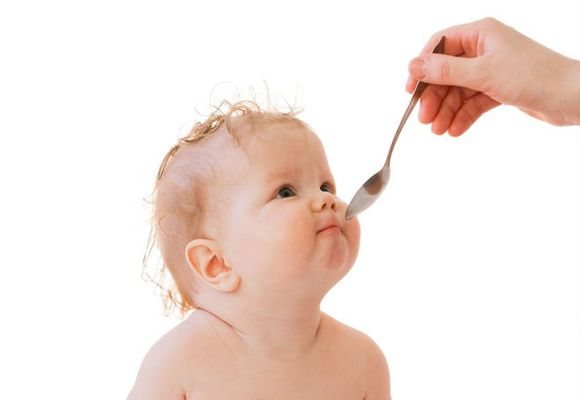
Syrups for children against wet cough
Consider the most effective syrups for productive coughs in children.
Dr. Theiss
This cough syrup is of plant origin only. It includes plantain, mint, beets. Improves sputum discharge, both in the lungs and in the upper respiratory tract. Should not be taken simultaneously with medications for dry cough . Dr. Theiss is a remedy only for productive coughs.
- Children are prescribed from one year of age.
- Take 2.5 ml 4 times a day. The syrup should be washed down with warm water.
overslept
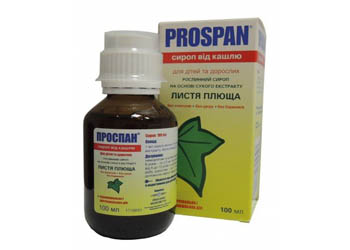
This syrup consists of ivy extract , i.e. also of plant origin.
Therefore, Prospan is a cough syrup specifically for young children.
Ivy has mucolytic, expectorant, antispasmodic, antimicrobial and antitussive effects.
Prospan removes difficult-to-separate viscous sputum from the body.
One minus is that skin rashes in the form of urticaria, itching are possible, because... ivy is a plant to which children are very often allergic.
- Prescribed to children from 1 year.
- Take 3 times a day, 5 ml.
Bronchicum
Bronchicum is a herbal cough syrup based on thyme. Minus – contains ethyl alcohol. Age limit – up to 2 years. It is used as an expectorant for inflammation of the upper respiratory tract, which is accompanied by a cough with thick, difficult to separate sputum.
It is also not recommended to take it together with antitussives.
- Take 1 teaspoon 3 times a day.
- The course of admission is 14 days.
Herbion primrose syrup
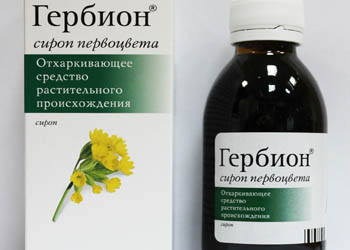
Unlike Herbion with plantain, primrose syrup should be used for a productive cough.
It has an expectorant effect and is a herbal preparation.
Does not contain alcohol. The downside is that it is very sweet and cloying . Children drink it reluctantly and often refuse to take it
Gerbion syrup with primrose is prescribed for cough for children only from 2 years of age.
- Take 3 times a day, 0.5 teaspoon.
- Course – 2-3 weeks.
Ambrobene
Ambrobene is a children's wet cough syrup. The main composition of Ambrobene syrup is ambroxol. The only product on the market that does not contain preservatives or thickeners. Therefore it is allowed for infants . It has an expectorant and mucolytic effect.
- Ambrobene (syrup for children) is prescribed 2.5 ml (0.5 tsp) 2-3 times a day.
- The course of treatment is 7 days.
An undoubted advantage is that Ambrobene is available in the form of syrup for inhalation. It is convenient to use for older children.
Folk wisdom in the treatment of cough in one-year-old children
And yet, many parents prefer not to give pharmaceutical products, but to use traditional treatment to combat cough. In this case, the following methods are distinguished: rubbing and warming compresses, taking decoctions or tinctures, warm medicinal drinks.
When should you start feeding your baby cereal? The answer to this question is ambiguous; it directly depends on the physiological development of the baby. The timing for each child is strictly individual. Moms just need to remember the golden rule of introducing new dishes, which advises introducing only 1 new product every 3 weeks.
Did you know that doctors do not recommend buying a pillow for a newborn until he is 1 year old? The danger of using it is that the child tosses and turns in his sleep, therefore, turning over, he can bury his face in the pillow. Our article will tell you more about choosing a pillow.
Rubs and compresses (usually done before bedtime)
- smear the baby’s chest and back with turpentine ointment, wrap him warmly and put him to bed;
- Place a flat cake made of flour with honey and vodka on the child’s back and chest (avoid the heart area). In the absence of an allergic reaction, the cake can be “strengthened” by adding dry mustard powder.
Decoctions, mixtures and tinctures
- cut off the top of the black radish, slightly remove the core and fill the resulting “niche” with liquid honey. After 8-12 hours, take the tincture 1 teaspoon three times a day before meals;
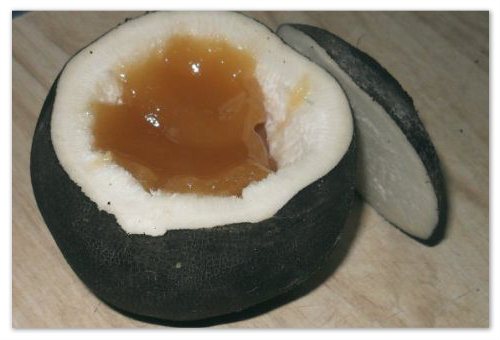
- Finely chop the onion (or grate it) and place it in a deep plate (cup). Mix the released juice with liquid honey, let it brew and give the child water 3 times a day;
- Squeeze the juice of 1 medium lemon into a 250 ml glass, add medical glycerin to it (the amount equal to lemon juice), and fill the rest of the glass with liquid honey. The mixture is thoroughly mixed and given before meals three times a day, a dessert spoon;
- honey (300 g) is poured into half a glass of boiled water, crushed aloe leaf is added and simmered for 2 hours over low heat. After cooling, give the child 1 tsp. 3 r. in the village
Warm drink
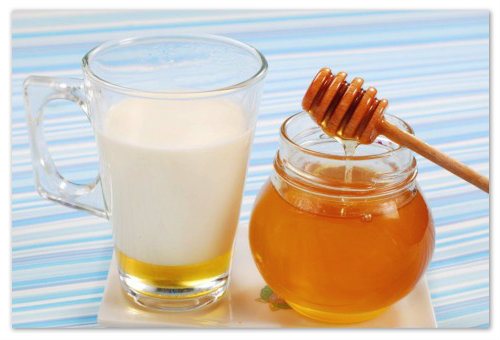
- add 1 tsp to warm milk. fat (goat, pork) and honey. Give the child something to drink at night;
- A cough attack can be stopped using the following remedy: melt 1 tsp. sugar over heat until syrup forms. Pour the resulting syrup into warm milk and give it to the child to drink. Frozen sugar candies are easily dissolved by children.
Syrups for children against dry cough
Fluditek
Fluditec - syrup for children against dry cough. Effective for bronchial asthma, tracheitis, bronchitis, pneumonia. The main active ingredient in Fluditec cough syrup is carbocisteine. It has a mucolytic and expectorant effect.
- Take 5 ml 2 times a day.
- The course of admission is 3 days.
The downside is the rather high price.
Bromhexine
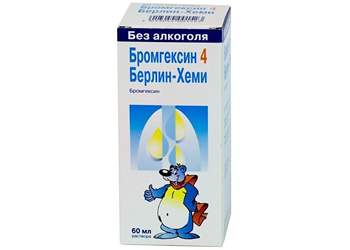
This syrup for children has no age limit and can be used in children under 1 year of age.
The active substance is bromhexine hydrochloride. It has a mucolytic and expectorant effect.
Bromhexine children's syrup helps liquefy and remove mucus.
For children there is a separately produced form of the drug - Bromhexine Berlin Hemi syrup for children. It has a pleasant taste that kids really like.
Bromhexine syrup for children is a remedy for unproductive, painful cough. It is prescribed for tracheitis, bronchial asthma, cystic fibrosis, tuberculosis.
- from 0-2 years, take 2.5 ml 3 times a day;
- from 2 to 6 years – 5 ml 3 times a day.
- Course – 6 days.
It is advisable to consume a significant amount of liquid when taking it to achieve the best treatment effect.
Dr. MOM
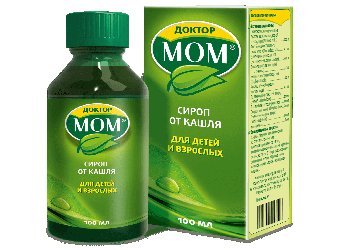
This cough syrup for children also contains herbal ingredients that help eliminate dry cough.
Aloe, elecampane, ginger, wasaka, nightshade, licorice, cubeba pepper are the main plant components of the syrup.
Doctor IOM syrup for children has bronchodilator, expectorant, anti-inflammatory and mucolytic effects. Relieves acute attacks of dry cough. Recommended for children from three years of age .
- Take 0.5 teaspoon 3 times a day.
- Duration of treatment – 14 days.
Herbion plantain syrup
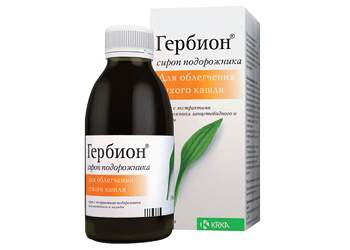
Gerbion syrup is prescribed for dry cough. Has a mild effect on the inflammatory process in the lungs.
It envelops the affected areas, removing phlegm from there.
The main distinguishing feature is the gentle elimination of dry cough . Syrup of plant origin. Contains a small amount of alcohol. Recommended for children from two years old.
- Give 3 times a day.
- Course – 7 days.
What are the signs that a child has an allergic cough? How to distinguish it from infectious. You will learn about this and more from the article.
Treatment of obstructive bronchitis in children is described in this article. Its differences from ordinary bronchitis are also described.
Sinekod
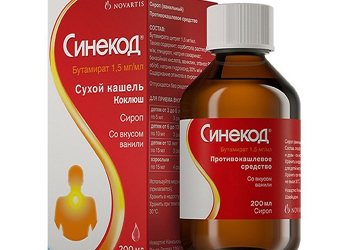
Sinecode for children - a medicine against dry cough.
It has a central effect on the source of inflammation, reducing cough. Relieves attacks
suffocating cough and makes breathing easier.
Does not include plant components . It is a synthetic drug containing a bronchodilator - butamirate.
Used for whooping cough, bronchitis, tracheitis. Probably, Sinekod is the most effective children's syrup for dry cough, but the price is not as reasonable as that of other drugs.
Analogues of Sinecode, which will cost much less
- Codelac NEO;
- Bronchoton;
- Broncholine sage;
- Bronholitin.
Sinekod for cough is prescribed to children from three years of age no more than three times a day. It also comes in drops and dragees.
- Drops can also be prescribed to infants aged 2 months and older. Dragee - from 6 years.
- The course of treatment is 7 days.
Glycodin
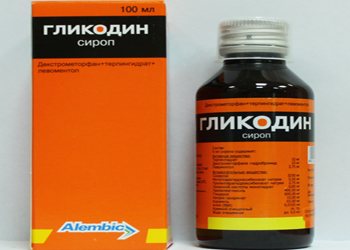
This syrup is used in the treatment of acute diseases of the respiratory system.
Glycodin improves sputum discharge and relieves dry cough. Effective for painful paroxysmal cough.
Glycodin syrup contains the following synthetic substances: dextromethorphan, terpin hydrate and levomenthol.
Contraindicated for bronchial asthma and children under 1 year of age. Minus - the syrup can cause overexcitement in the child.
- The course of treatment is 4 days.
- Take 2 times a day.
Bronholitin
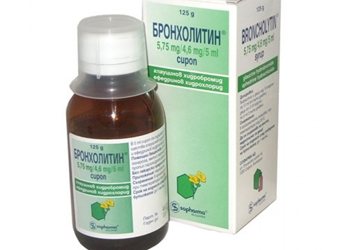
Broncholitin cough syrup is similar in action to Bromhexine. The active substance is glaucine hydrobromide and ephedrine hydrochloride.
It has a suppressive effect on the cough center, eliminating dry cough for up to 6 hours .
It also has anti-inflammatory and antiseptic properties. Age limit for children under 3 years old.
- Dosage: 5 ml of medication diluted in water 3 times a day.
- The course of admission is 5 days.
Most of all, parents worry about their children with a dry cough. Inhalation with a nebulizer for dry cough is another assistant in treatment.
We have taken care of the selection of effective cough inhalers and nebulizers in this article for you.
Cough compresses for children: here you will learn the pros and cons of this treatment method.
Comparative table of cough syrups for children over 1 year old.
| Name | Operating principle | Age, years | Contraindications/Side Effects | Dosage | price, rub. |
| PROSPAN | Improves the discharge of difficult to separate sputum | 0 | Component intolerance | 2.5 ml | 89 |
| BROCHOLITIN | Bronchodilator, expectorant | 3 | Glaucoma, heart disease | 5 ml | 100 |
| GLYCODINE | Antitussive | 1 | Intolerance to components, asthma | ¼ tsp. | 120 |
| AMBROBENE | Expectorant, mucolytic | 0 | Component intolerance | 2.5 ml | 129 |
| BROMHEXINE BERLIN CHEMIE | Dilution and separation of mucus | 0 | Kidney disease, liver disease, ulcer | 5 ml | 165 |
| DOCTOR MOM | Bronchodilator, expectorant, mucolytic | 2 | Increased sensitivity of components | 2.5 ml | 184 |
| GERBION | Expectorant, mucolytic | 2 | Ulcer, diabetes | ½ tsp. | 265 |
| FLUDITECH | Antitussive, mucolytic | 2 | Nausea, allergic reactions | 5 ml | 315 |
| BRONCHICUM | Mucolytic, expectorant | 2 | Fructose intolerance | 5 ml | 320 |
| DOCTOR THEISS | Expectorant | 1 | Component intolerance | ½ tsp. | 345 |
| SINECODE | Antitussive | 2 | Individual intolerance to components | 5 ml | 395 |
How to treat a cough in a one-year-old child
Antitussive medications are practically not prescribed to infants. The reason for this is the underdevelopment of the pulmonary and nervous systems; medications can aggravate the condition. To cure a cough in a child of the first year of life, it is better to use physiotherapy and provide comfortable conditions.
Cough medicine for children over 1 year of age is prescribed only by a doctor. At this age, the centers of the brain are still poorly developed, the baby cannot fully remove phlegm. The wrong medicine will complicate the situation.
After examining the child and collecting anamnesis, the doctor will prescribe the correct treatment that will alleviate the condition.
For respiratory diseases, the symptom of which is cough, two types of drugs are used:
- Antitussives. Pharmacological action is aimed at eliminating the symptom itself. In turn, the group is divided into two subgroups. The first includes drugs containing codeine. This substance blocks receptors in the brain stem, accordingly reducing the number of annoying attacks. The second includes agents that affect the mucous membrane of the respiratory tract, envelop it, and slightly anesthetize it.
- Expectorants. This series of drugs helps to liquefy accumulated mucus, making it easier to pass through the narrow bronchial branches.
Separately, I would like to highlight cough medicines for children over one year old that relieve obstruction. This medicinal series contains hormones that relieve spasm at the central nervous system level, ensuring normal patency of the organ.
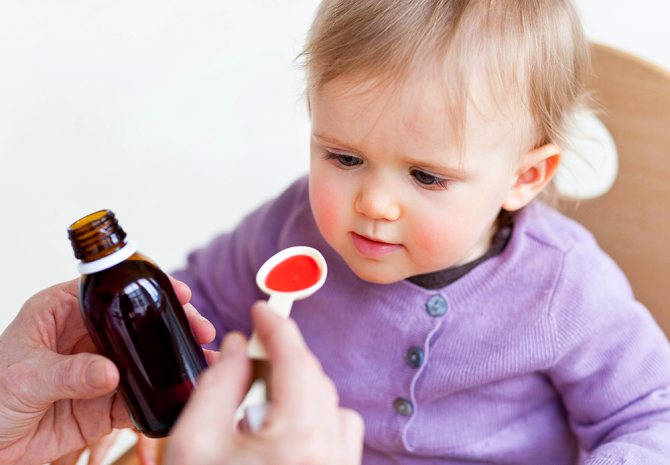
Reviews from parents
Nadezhda, 34 years old, Kirov
To treat a cough, I bought Gerbion syrup with primrose for my child. I won't say it's great.
They drank it for 2 weeks, after which the child began to cough and continues to cough, although the attacks have decreased. The cough has become a little softer. Not worth that kind of money!
Olga, 28 years old, Tyumen
Only Sinekod cough syrup helped my baby. He was literally suffocating! I read reviews on the Internet about Sinekod (syrup for children), bought it and was not disappointed.
The first night the baby slept peacefully! Although the price is steep, it costs us about 400 rubles.
Tatyana, 27 years old, Krasnodar
I bought Bromhexine Berlin Hemi syrup for my 2-year-old son and 5-year-old daughter. Of course not a fountain! The doctor prescribed this syrup for wet coughs for children.
It seems to be inexpensive, but the long-awaited effect was never achieved. It's a pity, we just lost time and money!
What can you give a month old baby for a cough?
As a rule, in newborns this symptom is associated with inflammatory disease of the respiratory tract. In such cases, medications for treatment are prescribed exclusively by a doctor. When prescribing mucolytic drugs, the severity of the cough reflex is taken into account, since in premature infants and those with neurological disorders, their use can cause stagnation of sputum in the bronchi and aggravate the course of the disease.
Some therapists recommend giving Stodal homeopathic syrup, which has no age restrictions. However, as practice shows, the effect of its use is questionable. Like all homeopathic remedies, this syrup has a very low concentration of active ingredients and is able to “treat” only due to the “placebo” effect, which is simply not yet possible at such an early age.
Reviews from doctors
Kulikov Andrey Stepanovich, pediatrician, children's clinic No. 7, Moscow
I can only give positive feedback about Fluditec cough syrup for children. It acts softly and quickly. It has a pleasant taste, small children take it with pleasure.
One piece of advice: do not use it for a long time. Only 3 days!
Korostyleva Marina Viktorovna, pediatrician, children's clinic No. 4, Nizhny Novgorod
In practice, I prescribed Prospan syrup for dry coughs for children under one year of age. The children who underwent treatment showed good dynamics.
The syrup acts quickly; sputum begins to disappear already on the 3rd day. In my experience, there have been no allergic reactions to the drug.
How do cough medications work?
To treat different types of cough, three groups of drugs with different active ingredients are used:
- Antitussives. Suppress cough. They are used during dry paroxysmal severe cough, whooping cough in order to alleviate the baby’s condition. The active ingredients of such drugs are: sodium butamirate, glaucine hydrochloride, oxeladin.
- Mucolytics. They dilute mucus, reduce its elasticity and viscosity. Prescribed for dry, non-productive cough (with sputum difficult to separate), usually in combination with expectorants. Active ingredients: ambroxol, carbocisteine, bromhexine.
- Expectorants. They are prescribed for a wet cough in a child to facilitate the separation of sputum by increasing its quantity and accelerating its movement through the respiratory tract. As a rule, extracts of medicinal plants are used. Babies may experience allergic reactions to some types of herbs, so expectorants should be used with caution and under the supervision of a doctor.
Important! It is prohibited to independently combine antitussive drugs with expectorants and mucolytics. If there is an excessive accumulation of sputum and there is no cough, pneumonia can quickly develop.
